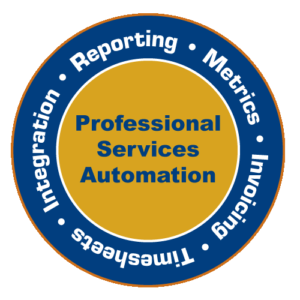How Professional Services Automation (PSA) Can Improve Your Operational Success
What is a PSA Tool?

There are many automation tools available today that most of us are using in our day to day business such as CRM and ERP. But, have you heard about PSA? PSA, the acronym for professional services automation is, in simple terms, a software solution that helps to gather information to run a professional services organization. What makes it different is the ability to provide more real-time insight into the tasks that are being performed within an organization.
There are many PSA tools out there, but before choosing one, you should define your purpose for needing one. Do you want to track projects more accurately? Or do you need to get better information on resource availability or utilization, or would you like to make sure that you have a easier and more centralized access to information? These are good reasons to have a PSA tool, but the main purpose of a PSA tool is to have a system that tracks information for analysis that will help you run your professional services organization more efficiently.
Begin with Identifying Your Requirements
Once you’ve determined what purpose your PSA tool will serve, you want to make sure that the tool you select meets some basic requirements. You want to make sure the tool is scalable as you grow the company, but you should also:
- Identify what is critical for organizational reporting
- Describe key components of project management
- Define end user needs, including mobile access and usability
- Define your business processes
- Determine frequency of resource scheduling changes, duration of projects, and time entry period needs, etc.
- Highlight compliance requirements and audit needs
- Identify collaboration and communication needs
Three Considerations for Selecting a PSA Tool
A PSA tool’s primary purpose is to support your business model and processes. You don’t want to craft the way you run your company around the tool that you pick. You should pick a PSA tool to support and enforce your business model and business processes. Below are three capabilities to consider and focus on:
- The ability to enable your resources to complete daily tasks. If you want your PSA tool to allow your executives to know what’s going on in real time, take into consideration that potentially 90% of the users are going to be ‘out in the field’, and you want to be able to make their daily tasks easy to complete.
- Providing transparency to organizational metrics. Each level in an organization has different reporting and data needs. The PSA tool that you select should be able to meet all of those needs, and it should be able to collect the data that can support those organizational metrics. Some examples are: bid-to-win ratios and average bill rates; billable utilization targets and people achieving those targets; and capacity versus demand and planned versus actuals. These are all metrics valuable to regular executive management reviews for decision making.
- Standardizing methodology. When you implement a PSA tool, it will help to reinforce defined processes that may already be in place, such as timesheet compliance. The PSA tool can also introduce methodology as a part of the tool rollout which may not have been able to be enforced because each employee has kept individual Microsoft Project or Excel files, which stood in the way of having audit capabilities for adopting standard methodologies.
Not Limited to Serving Professional Services Alone
While “professional services” is in the name, “professional services automation”, is not limited to professional services companies. PSA tools can benefit companies with managed services, field services, and education service teams. There are examples of companies who implement network and hardware solutions, or entire support teams that have to track types of tickets, or for equipment installs, such as medical equipment installs. Creative agencies that are doing website builds, ad campaigns, or mail promotions can also benefit from PSA, as can staffing organizations looking to track their resources, or construction companies that flip houses. There’s a wide variety of businesses with project work that can benefit from a PSA tool to meet their company’s needs. It’s just a matter of knowing your needs and finding the right tool to implement.
For more information on PSA tools and how they can benefit your professional services organization, check out our frequently asked questions at http://mh5142testing.info/professional-services-resources/frequently-asked-questions/.
If you would like assistance with choosing and implementing PSA tool, TOP Step Consulting has over eight years of experience in assisting companies with just that. Contact us at info@topstepconsulting.com to see how we can help you in finding the best PSA solution for your business needs.
